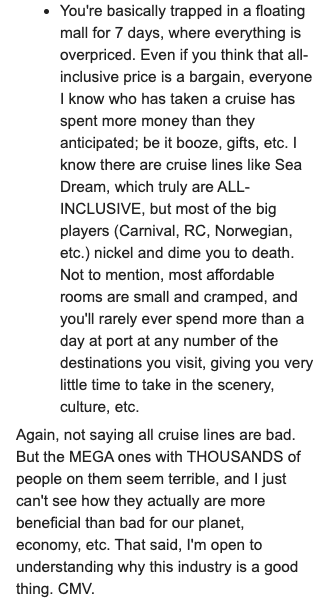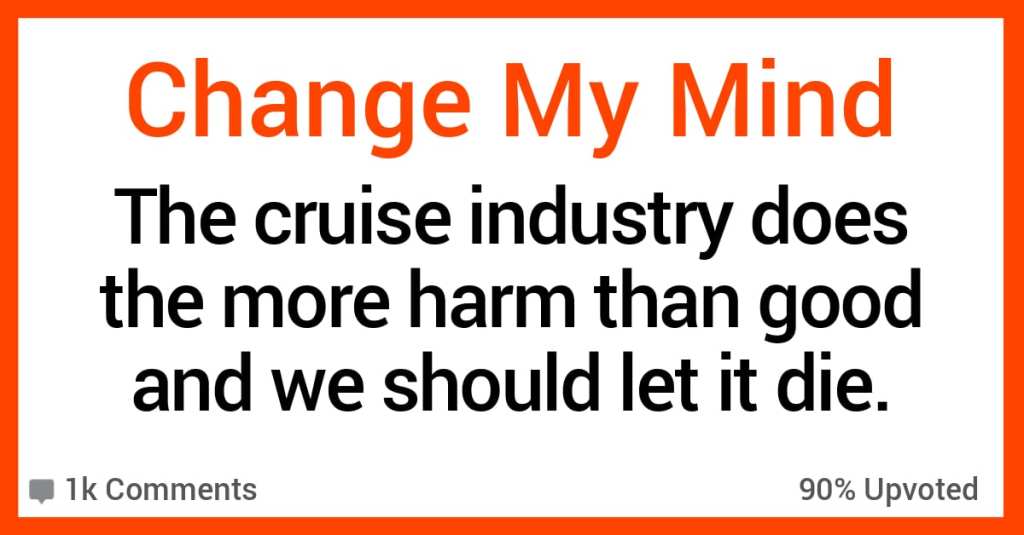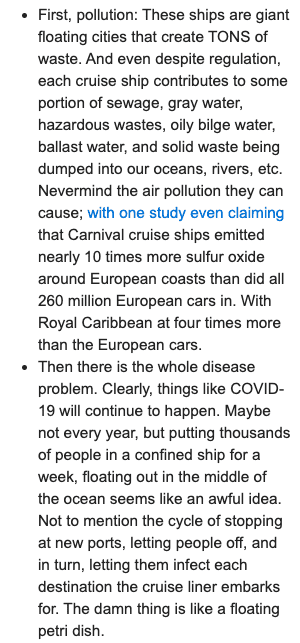Say what you will about the situation we find ourselves in right now, but it has given us the time and space to take stock what is really important and necessary in our lives.
The planet, being left alone more often, is starting to heal from our over- and misuse, so some people – like this person on Reddit – think we should take this opportunity to get rid of harmful industries, like the one that takes us on big cruises.

Image Credit: Reddit
Cruise ships are harmful to the environment, it poses a health risk in the best of times, it takes tons of money from folks and provides a pretty lackluster experience.
Basically, he argues they do more harm than good, and we should show them the door.

Image Credit: Reddit
These 14 people are doing their best to change that view.
14. A bit of science.
First, pollution: These ships are giant floating cities that create TONS of waste. And even despite regulation, each cruise ship contributes to some portion of sewage, gray water, hazardous wastes, oily bilge water, ballast water, and solid waste being dumped into our oceans, rivers, etc. Never mind the air pollution they can cause; with one study even claiming that Carnival cruise ships emitted nearly 10 times more sulfur oxide around European coasts than did all 260 million European cars in. With Royal Caribbean at four times more than the European cars.
I’m extremely pro environment but these two stats seem misleading. We can’t just look at the water waste that cruises cause and call it a day. We need a point of comparison if we’re to indict cruises. For that, we need to find what people would be doing if they weren’t on cruises and compare the waste those activities generate and then find ways to compare the two (e.g. energy equivalents or cost of damages).
Likewise for the sulfur oxide stat. Are cruise ships using fuel where sulfur oxides are an expected byproduct? Are cars? What are the total CO2 equivalent emissions for both? And again, why are we comparing cruises with cars as opposed to the activities people would partake in if cruises weren’t an option?
13. Some context is necessary.
On your pollution argument, I had an anecdote to share.
I once took a cruise to Glacier Bay in Alaska aboard the now-doomed Grand Princess (haha). Being a national park, they had all sorts of restrictions on what the boat could do (like no dumping ballast water, no straws or paper outside, etc).
These restrictions, while valuable, seemed to not be enough to solve the problem of pollution coming from the big boat. I asked a ranger on board what he thought about this, and he basically said that one big boat is a heck of a lot better than having even half of the people come in their own individual boat or plane because they’re more likely to leech stuff into the water or bring some invasive species in (individual boats are harder to control), plus the collective pollutants are about the same. So it’s better to let people see the Bay on a cruise than for them all to come individually.
Just a thought. The pollution needs to be put in context for how many people are on the boat, where it’s going, and how far it’s travelling.
12. Think of the jobs.
It’s a massive industry I don’t think you really grasp. It creates thousands and thousands of jobs and hundreds of millions in revenue. Any city is affected positively when there is a cruise ship in town. In Vancouver, there are upwards of 3 at a time, 4 or even 5 at separate ports during peak season. I, for one, have the cruise industry to thank for providing me with stable, seasonal employment during my University life.
Think of the logistics and business of thousands of tourists in a city:
They need to go to their hotels so they give taxi drivers business.
They help gift shops and tour companies and local hotels by shopping around and sightseeing.
People need to get hired to assist these people in getting on the ship.
People need to get hired to direct traffic. Think of how many cars that is.
People need to get hired to load their luggage. And no, it’s not the same company doing all the loading, unloading, checking-in, check-out, etc. There’s contracts and partnerships in place. It’s a very well-oiled machine.
Then you have the entire ship’s crew to hire and keep happy.
Local economies in the Cayman Islands or whatever are bolstered due to these tourists. I don’t know anything about it but it would not surprise me to learn that many Caribbean countries are mostly if not totally dependent on the cruise industry.
I would say that in general, cruises create more good than harm.
11. It might not actually be worse for the environment.
Generally it is much more efficient to move a single, heavier vehicle than several smaller ones equalling the weight of the single. Exact numbers are hard to find from a quick Google, I’m seeing 130-150 tonnes of fuel per day of ships with a gross tonnage of 150,000+ [source]. Scaling this back to the 108,000 tonne Grand Princess, worst case is 110 tonnes/day. Bit of napkin maths takes this to 1.197 litres per second. (Assuming density of 0.94kg/l). This is ignoring the six GMT V-16 service power generators on the ship [source]. This seems a little low, applying a 1.1x excrescence/inefficiency multiplier takes it to 1.316l/s. There are two engines on the GP, 21MW/ea, so 2.632l/s (though really doing it by weight than by the number of engines means I shouldn’t double it).
GP can hold 3,100 passengers, not accounting for crew. Let’s say some of them decide to take themselves and their spouses on a nice vacation to Glacier Bay in their small boat (so shall we say 1,000 boats). If our 1,000 boats are feeling particularly environmentally friendly, they might be burning 0.0158 litres per second (converted to metric from here). 1,000 boats makes that 15.8l/s.
So assuming my napkin maths is correct, one big damn liner is a fair bit more efficient than 1,000 little ones. Feel free to correct me, it’s been a while since I’ve done fuel consumption figures.
TL;DR Big ship burn 1.3-2.6 litres per second, 1,000 little ships burn combined 15.8 litres per second.
10. Seems like a bigger issue.
Have you never been on a cruise?
Visit one of the islands that cruises go to and ask the locals how the cruise industry impacts their lives.
These economies wouldn’t survive without the cruise industry.
9. Maybe just an overhaul.
I also don’t like crowds. I did, however, go on a couple cruises with family when I was young and had a great time. I remember it not being very expensive, the crowd was definitely an economy crowd. It was also super bowl weekend and I think it was a time the cruise line had a difficult time getting people to go. My parents are great with their family budget – so I would say it’s an industry (like many) that optimizes for spend (micro transactions while on ship and at tourist sites – hello free to play). A lot of vacations tend to have spend creep.
The guests on the ship were actually pretty awesome from what I remember. I think what worked out for me was there weren’t a lot of young families (no kids running around) or any party crowds. If it was a musical festival cruise – I’d probably stay away.
Some friends of mine go on singles cruises and love them. So I imagine there is a cruise for everyone.
I currently don’t have kids and would definitely be that jerk that might spend a bit extra for a smaller cruise with lower population density on the ship. I would probably only do this once every 5-10 years. Knowing my friends, they would do the same thing. Multiple that by the probability that other people would do the same thing and you got yourself a bunch of smaller boats polluting.
I don’t disagree with your sentiment though – most of our industries need an overhaul. Also – cruises aren’t for anyone and it’s good that not everyone does them.
8. A little thing called wealth transfer.
You’re missing a fundamental point, in engineering almost always economies of scale makes things cheaper to operate, particularly things like energy consumption and management.
So if your concern would be to limit the impact on the environment it would be way easier to do it with a few very large ships than a bunch of small ones.
Things like high sulfur fuel oil and the emission problems caused by then could easily be solved by first world countries banning together and passing laws that eliminate their use, but we are addicted to cheap freight.
Add to it, cruise ships are a way for wealth transfer from wealthy countries to small Caribbean countries. Many of the small Island countries have economies bolstered by the cruise industry.
Finally, if people want to go sit in a floating mall that’s their prerogative. Most people think Disney is an amusement park, but it’s really a shopping mall that happens to have rides. Cruise lines are no different. Lot’s of people want to waste their money on far stupider stuff (letter tickets anyone?) but we have no issues with that.
7. If you’re a snob…
Cruise ships do create a lot of pollution but not when you consider they are all inclusive. When you take a cruise, the ship is your hotel, transportation, entertainment, and restaurant all in one. If you take the combined carbon generated by a tourist having to drive between locations, stop and eat 3 times a day at a restaurant, go to multiple hotels, then the carbon offset kind of equals being on a ship.
As for the other half of your opinion, a lot of people like cruises because it’s an easy and fun way to get away and see parts of the world that would otherwise need extensive planning, car rentals, navigation, passport control, and so on. When you arrive via cruise ship, you jump off for the day to explore, and then hop back on again for more fun the next day.
Not all cruise ships are miserable floating cages like you make them out to be. If you travel on the nice cruise lines, the food is actually very good, the entertainment is great, and the ship is full of classier people that tend to dress nicely and act civilized. I’ve been on some awesome cruises with my friends where we had just as much fun off ship as we did on ship, because we sailed with a middle-upper class cruise line.
6. If you want to get fancy.
This is a bit of a logical fallacy, aka an appeal to emotion. You can do both.
There’s no reason you can’t do both.Ecotourism can be a sustainable way for these countries to both preserve their ecology and improve their economy by offering an alternative to resource stripping or subsistence farming.
Ultimately there are technical questions, and there are ethical questions. Often the latter can be answered with the former.
5. This person is arguing FOR sewage waste.
I wanna address the air pollution aspect of your argument. Large ships in general are actually very fuel efficient when compared to smaller vehicles. Sure, they may burn tons and tons of fuel, but if you do the math, they actually burn less fuel than would be required by other vehicles to move the same amount of cargo & people over the same distance. There is some room for improvement though, most cruise liners use relatively poor quality diesel fuel because it’s cheaper. Imposing the same emissions standards we have on cars, or allowing civilian liners to use nuclear propulsion would go a long way towards fixing this.
I also want to address the sewage waste argument. Sewage waste only harms the environment when it includes man made items like wipes, chemicals, tampons, etc. Or when it’s heavily concentrated into one area. Sewage waste can actually be good for the environment if it’s spread out, that’s because it puts nutrients back into the ecosystem.
Finally about the disease bit. This is why ships aren’t allowed to make port if they have infected people on board, this has been settled maritime practice for a long time. In fact ships like that actually make it easier to enforce a quarantine because they can remain at sea indefinitely given a steady stream of supplies and the crew physically can’t leave the ship without extreme risk to themselves.
4. Maybe just a few tweaks.
I think a more helpful way to think about the cruise industry is “would we support it so it can survive in its current configuration?”. To me, the answer to that is clearly no—for several reasons:
1) Ships are registered in loosely regulated countries 2) Staff are paid little and have very limited workplace rights 3) Cruise lines are avoiding taxes by incorporating in countries they neither visit nor Where they draw a significant clientele 3) Guests think they are on a floating hotel, they are not. You are a passenger, and under the command of the Captain. This means limited rights in legal and medical situations.
I think there are reasons to have cruises (limiting not traffic in sensitive areas, bring revenue into otherwise overlooked ports, easier travel for those with disabilities, and democratizing access to the oceans). But when it comes to a bailout, I think cruises have kind of made their own bed. Any support needs to come from either the countries they are paying taxes in, or it needs to come with massive reform in their organizations.
3. I’m not sure this is true all of the time.
Funny how the sacrifices people want to make to help the environment never seem to be ones they have to make.
No, they’re sacrifices that others have to make.
2. The original argument is “meh.”
You could make the same for any entertainment product you personally don’t enjoy.
Movies, sports, cruises – they all make tons of garbage and if you don’t happen to derive entertainment from them, then yeah, they’re terrible.
But shouldn’t the fact that thousands of people everyday board cruises indicate that there exist many people who do enjoy cruises.
In this way, I see no reason to single out cruises. They are just as bad environmentally as any other entertainment product, and seemingly enjoyed by large swaths of the population.
1. Too many opinions.
I am fine watching an entire industry die because I don’t care about going on cruises.
Your argument has a strong whiff of, “Stop liking things I don’t like!”Cruising isn’t my favorite (I’d always prefer a self-guided deep-dive), but for group trips, it’s hard to beat the convenience of a cruise. You don’t have to find a restaurant everyone agrees on, then figure out how to get everyone there at once. There’s plenty of stuff to do for people of all ages. The fact that they’re large makes it easy to do things as a group, but it’s also easy to find a semi-secluded spot if you want some private time. Yes, the port time is often short, but you’ll visit several different places, and it might be the way you decide, “I’d definitely come back here for a week!”
Our last cruise offered a galley tour as an excursion. Honestly, it was amazing. Sure, there’s a lot of waste in any sort of hospitality venture, but they discussed how they sort the food waste very carefully and some of it is eventually discharged into the ocean for the purpose of providing for the sealife, and that ‘s better than throwing it all in the dump like most restaurants and hotels do.
Cruise ships also have sophisticated water processing facilities, and the wastewater is processed so clean that many nations allow it to be discharged within their 12 mile statutory boundaries. The solids are retained and incinerated or offloaded for disposal. Ships also do a pretty good job of recycling, and minimizing single-use items.
Honestly, I thing the lines do try to minimize their environmental impact, and some ports do provide ecotourism employment for locals who might otherwise be forced to engage in work that can be extremely damaging to the environment.
My particular objection to cruise lines is the way they treat their employees.
Are you convinced one way or the other?
Tell us how you’re leaning in the comments!







